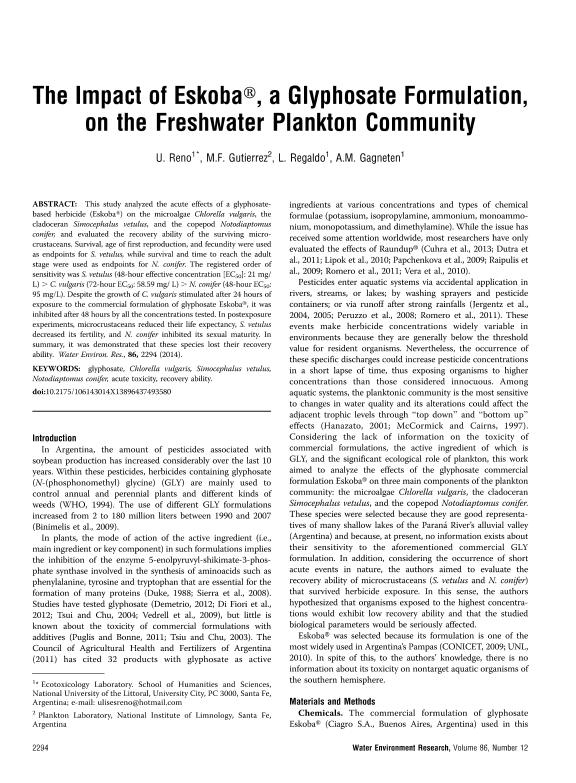Mostrar el registro sencillo del ítem
dc.contributor.author
Reno, Ulises

dc.contributor.author
Gutierrez, Marìa Florencia

dc.contributor.author
Regaldo, Luciana María

dc.contributor.author
Gagneten, Ana María

dc.date.available
2019-10-08T18:48:29Z
dc.date.issued
2014-12
dc.identifier.citation
Reno, Ulises; Gutierrez, Marìa Florencia; Regaldo, Luciana María; Gagneten, Ana María; The impact of Eskoba®, a glyphosate formulation, on the freshwater plankton community; Water Environment Federation; Water Environment Research; 86; 12; 12-2014; 2294-2300
dc.identifier.issn
1061-4303
dc.identifier.uri
http://hdl.handle.net/11336/85353
dc.description.abstract
This study analyzed the acute effects of a glyphosate‐based herbicide (Eskoba®) on the microalgae Chlorella vulgaris, the cladoceran Simocephalus vetulus, and the copepod Notodiaptomus conifer, and evaluated the recovery ability of the surviving microcrustaceans. Survival, age of first reproduction, and fecundity were used as endpoints for S. vetulus, while survival and time to reach the adult stage were used as endpoints for N. conifer. The registered order of sensitivity was S. vetulus (48‐hour effective concentration [EC50]: 21 mg/L) > C. vulgaris (72‐hour EC50: 58.59 mg/ L) > N. conifer (48‐hour EC50: 95 mg/L). Despite the growth of C. vulgaris stimulated after 24 hours of exposure to the commercial formulation of glyphosate Eskoba®, it was inhibited after 48 hours by all the concentrations tested. In postexposure experiments, microcrustaceans reduced their life expectancy, S. vetulus decreased its fertility, and N. conifer inhibited its sexual maturity. In summary, it was demonstrated that these species lost their recovery ability.
dc.format
application/pdf
dc.language.iso
eng
dc.publisher
Water Environment Federation

dc.rights
info:eu-repo/semantics/openAccess
dc.rights.uri
https://creativecommons.org/licenses/by-nc-sa/2.5/ar/
dc.subject
Chlorella vulgaris
dc.subject
Simocephalus vetulus
dc.subject
Notodiaptomus conifer
dc.subject
Glyphosate
dc.subject
acute toxicity
dc.subject
recovery ability
dc.subject.classification
Otras Ciencias de la Tierra y relacionadas con el Medio Ambiente

dc.subject.classification
Ciencias de la Tierra y relacionadas con el Medio Ambiente

dc.subject.classification
CIENCIAS NATURALES Y EXACTAS

dc.title
The impact of Eskoba®, a glyphosate formulation, on the freshwater plankton community
dc.type
info:eu-repo/semantics/article
dc.type
info:ar-repo/semantics/artículo
dc.type
info:eu-repo/semantics/publishedVersion
dc.date.updated
2019-09-27T14:14:43Z
dc.journal.volume
86
dc.journal.number
12
dc.journal.pagination
2294-2300
dc.journal.pais
Estados Unidos

dc.description.fil
Fil: Reno, Ulises. Universidad Nacional del Litoral. Facultad de Humanidades y Ciencias. Laboratorio de Ecotoxicologia; Argentina. Consejo Nacional de Investigaciones Científicas y Técnicas. Centro Científico Tecnológico Conicet - Santa Fe; Argentina
dc.description.fil
Fil: Gutierrez, Marìa Florencia. Consejo Nacional de Investigaciones Científicas y Técnicas. Centro Científico Tecnológico Conicet - Santa Fe. Instituto Nacional de Limnología. Universidad Nacional del Litoral. Instituto Nacional de Limnología; Argentina
dc.description.fil
Fil: Regaldo, Luciana María. Universidad Nacional del Litoral. Facultad de Humanidades y Ciencias. Laboratorio de Ecotoxicologia; Argentina. Consejo Nacional de Investigaciones Científicas y Técnicas. Centro Científico Tecnológico Conicet - Santa Fe; Argentina
dc.description.fil
Fil: Gagneten, Ana María. Universidad Nacional del Litoral. Facultad de Humanidades y Ciencias. Laboratorio de Ecotoxicologia; Argentina
dc.journal.title
Water Environment Research

dc.relation.alternativeid
info:eu-repo/semantics/altIdentifier/doi/http://dx.doi.org/10.2175/106143014X13896437493580
dc.relation.alternativeid
info:eu-repo/semantics/altIdentifier/url/https://onlinelibrary.wiley.com/doi/abs/10.2175/106143014X13896437493580
Archivos asociados
